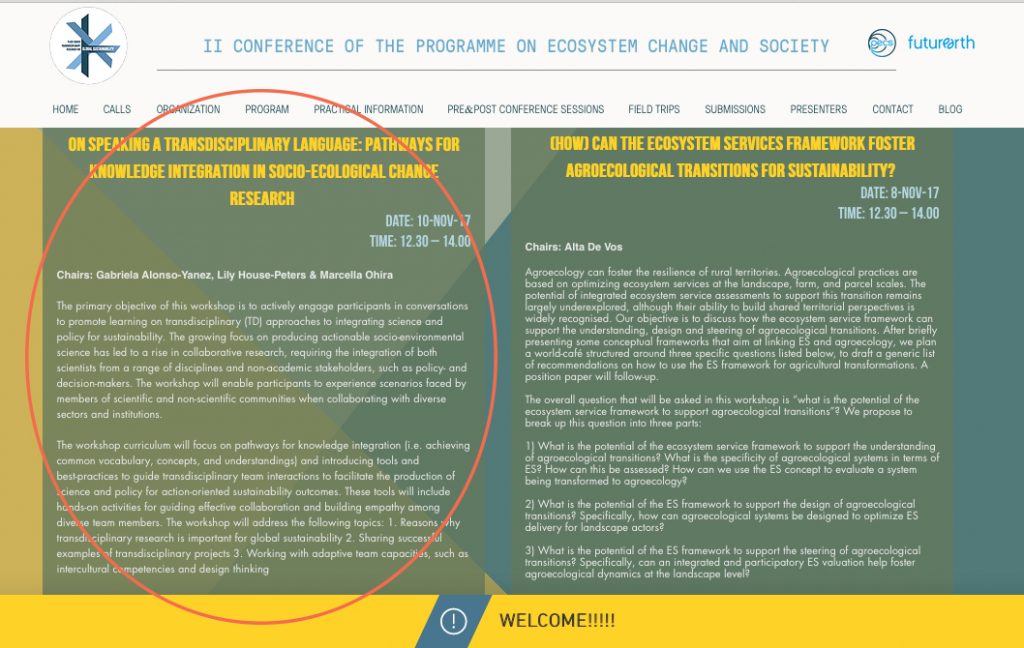IAI WORKSHOP @ PECS-II: On speaking a transdisciplinary language
7-10 November 2017, Oaxaca, Mexico
Pathways for knowledge integration and cross-sector collaboration
The IAI Director for Capacity Building, Marcella Ohira, is participating on behalf of the IAI Directorate in the II Conference of the Programme of Ecosystem Change and Society (PECS II), Oaxaca, Mexico, 7-10 November 2017.
PECS II focuses on the contributions of ongoing place-based transdisciplinary research undertaken in different parts of the planet to inform global sustainability. The premise is that solutions towards sustainability change dramatically across contexts. This meeting provides a unique opportunity for sharing insights gained within a wide range of contexts at local scales to identify pathways towards sustainability at different spatial scales and contexts.
IAI investigators, Dr. Lily House-Peters (California State University, USA), Dr. Gabriela Alonso (University of Calgary, Canada) and IAI Director for Capacity Building, Marcella Ohira will hold a flash workshop “Speaking a transdisciplinary language” on 10 November as one of the sessions of the Conference.
The primary objective of this workshop is to actively engage participants in conversations to promote learning on transdisciplinary (TD) approaches to integrating science and policy for sustainability. The growing focus on producing actionable socio-environmental science has led to a rise in collaborative research, requiring the integration of both scientists from a range of disciplines and non-academic stakeholders, such as policy- and decision-makers. The workshop will enable participants to experience scenarios faced by members of scientific and non-scientific communities when collaborating with diverse sectors and institutions.
During the workshop, participants will collaborate in TD teams to experience firsthand the challenges, and opportunities, this type of collaboration poses. Workshop activities will require that participants converse about the skills required to communicate across different disciplines, value others’ perspectives and points of view, and engage in productive teamwork with individuals from diverse backgrounds.
Workshop contribution to the general themes of the Conference
The proposed workshop addresses two of the general themes of the conference:
1. The workshop provides context-specific pathways for working towards sustainability in cross-sector collaborations by actively engaging participants in role playing exercises and open discussions to facilitate learning and share best practices about how large international teams, composed of scientists and non-scientists, navigate obstacles to successfully work together.
2. Engaging in facilitated dialogues and scenario-based role-playing, participants will discuss and experience the challenges and opportunities for informing global sustainability. Participants will gain insight and understanding of the perspectives of diverse actors ‘participating’ in transdisciplinary sustainability projects.
Specific questions or topics to be discussed
The workshop curriculum will focus on pathways for knowledge integration (i.e. achieving common vocabulary, concepts, and understandings) and introducing tools and best-practices to guide transdisciplinary team interactions to facilitate the production of science and policy for action-oriented sustainability outcomes. These tools will include hands-on activities for guiding effective collaboration and building empathy among diverse team members.
The workshop will address the following topics:
• Reasons why transdisciplinary research is important for global sustainability
• Sharing successful examples of transdisciplinary projects
• Working with adaptive team capacities, such as intercultural competencies and design thinking
Proposed workshop dynamics and interaction with atendees, including the help of facilitators
The objectives of the workshop will be achieved through participant-centered pedagogical strategies focused on current, real-world case studies that require transdisciplinary collaborations. Often presented as a problem or scenario, case study stories will provide context to understanding abstract ideas, skills, and competencies by offering more tangible ways for participants to understand the relevance of the workshop content. The facilitators will use the design thinking principles to invite participants to frame questions, analyze problems, and make sense of results through diverse perspectives. This systematic focus on transdisciplinary work and actionable knowledge will be central to the sessions.(design thinking) para enmarcar los interrogantes, analizar los problemas y dar sentido a los resultados a través de diferentes enfoques. Este foco sistemático en el trabajo transdisciplinario y el conocmiento accionable será fundamental en las sesiones.
The workshop is targeted to early to mid-career scientists in the humanities and social, natural, and engineering sciences, governmental, NGO, and community organization staff, and private sector employees. We strive to ensure representation of a diversity of roles in decision-making and research.

